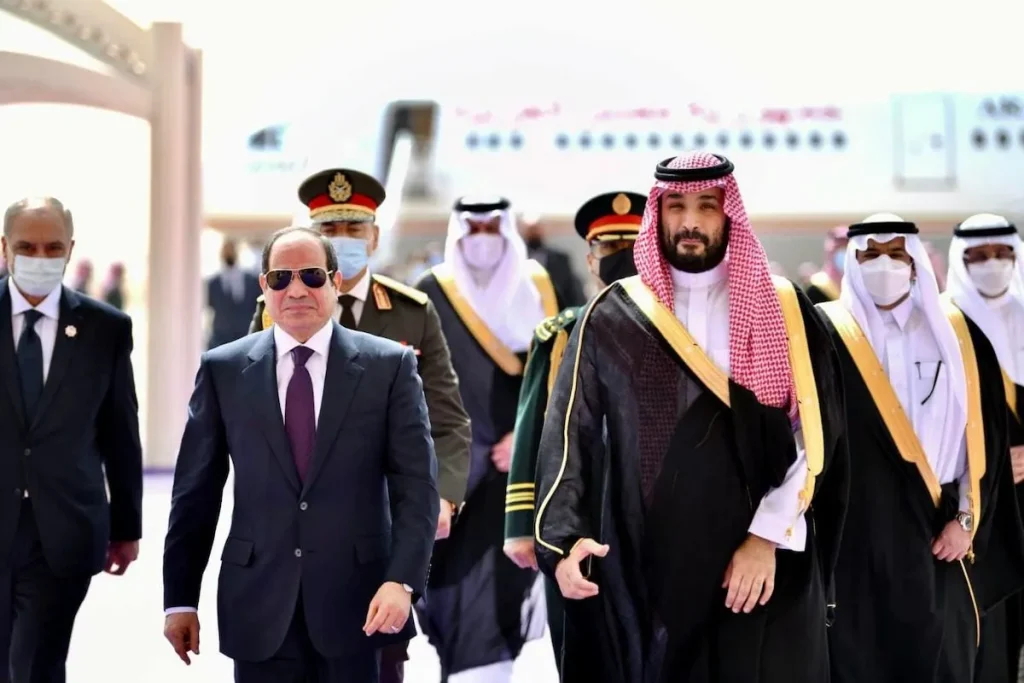- During a visit to Cairo on Tuesday by Saudi Arabia’s de facto ruler, Crown Prince Mohammed bin Salman, Egypt and Saudi Arabia announced business transactions totalling US$7.7 billion
- 14 agreements that were signed on Tuesday included a wide range of industries, from petroleum and food to fintech and renewable energy
- The rest of the Arab world benefits from solid connections between Egypt and Saudi Arabia
Egypt and Saudi Arabia announced business transactions totalling US$7.7 billion. The announcement came during a visit to Cairo on Tuesday this week by Saudi Arabia’s de facto ruler, Crown Prince Mohammed bin Salman.
The meeting served as a signal that the two countries intend to enhance their economic connections.
Since Egypt’s President Abdel Fattah al-Sisi came to office in 2014, Saudi Arabia has already supplied billions in support, and Cairo is grappling with the economic knock-on consequences of the Ukraine war. Already, Saudi Arabia has contributed billions of dollars to the effort.
The visit to Egypt marked the beginning of the prince’s first tour outside of the Gulf region in more than three years. He is most commonly referred to by his initials, MBS. MBS was to later travel to Turkey.
According to a statement released by the Egyptian presidency, the crown prince and President Sisi discussed a number of topics, including trade, investment, and security, as well as an upcoming regional summit that will be held in Saudi Arabia and will be attended by President Joe Biden of the United States.
The 14 agreements that were signed on Tuesday included a wide range of industries, from petroleum and food to fintech and renewable energy.
According to a statement released by the Egyptian cabinet, they had an agreement to construct a wind power plant that was worth US$1.5 billion and was made between Acwapower (2082. SE) of Saudi Arabia and the Egyptian Electricity Holding Company.
In a joint statement, Saudi Arabia was reported to be committed to taking the lead on investments in Egypt totalling US$30 billion; however, it was not clear what the sum related to.
Even before the Russian invasion of Ukraine at the end of February, which led to increased commodity prices, caused a drop in tourism income, and pushed investors to quit developing markets, there were concerns over Egypt’s current account and budget deficit, bankers said.
During the month of March, Saudi Arabia transferred US$5 billion to the central bank of Egypt. Previous statements made by the Egyptian government suggested that joint efforts with the Saudi sovereign wealth fund would result in financial commitments totalling US$10 billion.
It was announced last week by the CEO of the Saudi-based Islamic Trade Finance Corporation (ITFC) that new financing in the amount of US$3 billion had begun to be disbursed to assist Egypt in its efforts to purchase commodities.
Other agreements include the construction of a multi-purpose terminal at Egypt’s Damietta port, according to a statement issued by Egypt’s General Authority for Investment and Free Zones, and the establishment of a “pharmaceutical city” in Saudi Arabia by Egypt’s Pharco Pharmaceuticals, according to comments made by the company’s chairman to Alsharq TV. Both of these projects are estimated to cost a combined total of US$150 million.
Egypt Relations with Saudi Arabia
The relationship between Saudi Arabia and Egypt has been one of great distinction for many decades. The two countries, which are considered to be twin pillars, have strengthened their alliance and cooperation in order to enhance both their individual and joint regional postures. This is a continuation of a tradition of deep-rooted historical ties that were strengthened even further with the arrival of Saudi Crown Prince Mohammed bin Salman in Cairo on Monday.
Both symbolically and practically, the rest of the Arab world benefits from solid connections between Egypt and Saudi Arabia. The strategy of considering one another to be vital allies to the region dates back to May 7, 1936, when Egypt officially recognised the Saudi state. Historically, the two countries have regarded one another as essential allies in the region.
Through the years, the two countries have been able to triumph over adversity and disagreement, leading to the establishment of close diplomatic ties. This has been possible even during times of political upheaval.
Last year, the value of Saudi-Egyptian trade went up by 62 per cent.
According to data obtained from Egypt’s Central Agency for Public Mobilization and Statistics, the value of trade between Egypt and Saudi Arabia increased by 62.1 per cent to US$9.1 billion in 2021, up from US$5.6 billion in 2020. This figure represents a significant increase.
Increased by 17.3 per cent from US$1.9 billion in 2020 to US$2.2 billion in 2021, the value of Egyptian exports to Saudi Arabia reached US$2.2 billion in 2021.
The value of Egyptian imports from the Kingdom increased by 84.5 per cent, reaching US$6.9 billion in 2021, compared to US$3.7 billion in the previous year.
The total value of remittances sent back to Egypt by Egyptians employed in Saudi Arabia reached US$11.2 billion during the fiscal year 2020/2021, which is a 17 per cent increase when compared to the total value of US$9.6 billion sent back during the previous fiscal year.
The total value of remittances sent to Saudi Arabia by Saudi nationals working in Egypt reached US$18.5 million during the fiscal year 2020/2021, representing a 4.9 per cent increase when compared to the US$17.6 million reported during the preceding fiscal year.
The value of Saudi investments in Egypt came to a total of US$622 million for the fiscal year 2020/2021, which represents a decrease of 4.5 per cent when compared to the US$651.2 million recorded during the preceding fiscal year.
Read: Rising inflation forces Egypt to privatise key state companies
